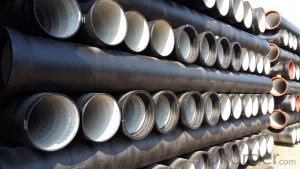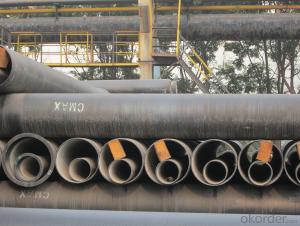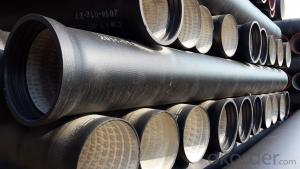Ductile Iron Pipe of China DN200-DN400 EN545/ EN598/ ISO2531
- Loading Port:
- China main port
- Payment Terms:
- TT or LC
- Min Order Qty:
- 20 m.t.
- Supply Capability:
- 50000 m.t./month
OKorder Service Pledge
OKorder Financial Service
You Might Also Like
1. Ductile Iron Pipe Description :
1) Pipes confirm to ISO2531,K9 class,T type joint,6m long,with inside cements lining conform to ISO4179, outside Zinc spraying(130g/m2) and bitumen coating(70μm) conform to ISO8179.
2) Pipe ends: Spigot and socket ends, with 100% SBR rubber gaskets accoding to ISO4633
3) We can do third party inspection according to customer's request.
4) Our products have been sold to many international market,such as Middle East and South East Asia and Africa.
2. Main Features of the Ductile Iron Pipe:
·High yield strength
·High tensile Strength
·High corrosion resistance
·Pressure Resistence
·Anti-corrosion
·Installation is convenient
·Satisfy the highest hygienic standards
3. Ductile Iron Pipe Images:
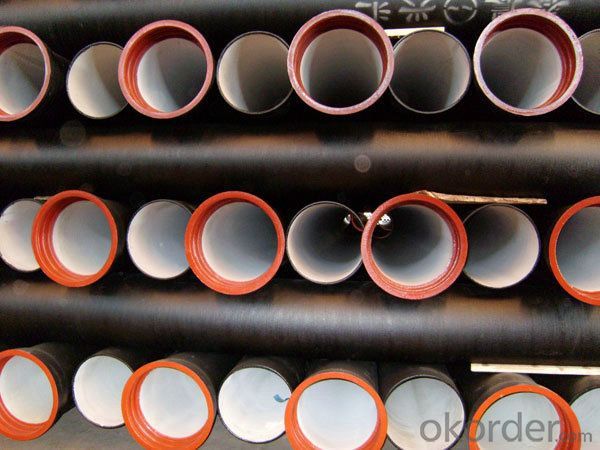
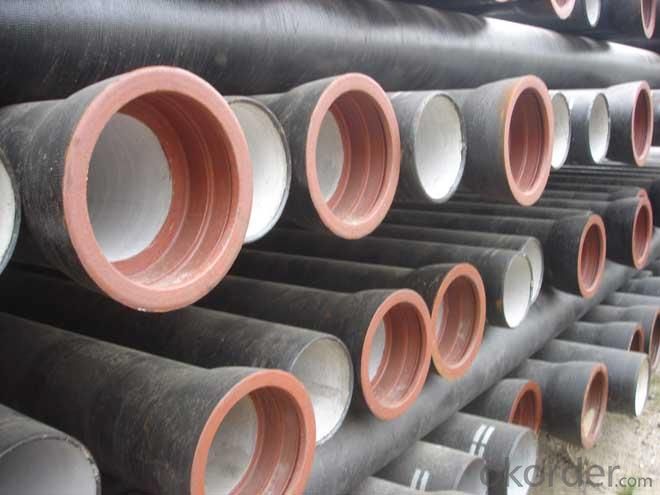
4. Ductile Iron Pipe Specification
Standard: API SPEC 5L 44th eidtion,ASTM A252-98(2007)
Grade: A53 Grades A/B, ASTM A106 Grades B/C,ASTM A179
AWWA, C200, ASTM A139, ASTM A120, API 5L Grade B
X42, X52, X56, X60, X65, X70, X80, X100
Weld Alternatives: LSAW
OD size range: 6.4~44.5mm
Wall thickness: 406.4~1422mm
Length: 3 - 12 m according to requirment
Note: Other grade can also be provided after consulting. Special design are available
for coal slurry conveyance LSAW line tube -- Service.
5. FAQ:
We have organized several common questions for our clients,may help you sincerely:
1).Q: Why would you choose ductile iron pipe rather than other pipe materials?
A:The reasons are obvious for that not only ductile iron pipe possesses the inherent strength and flexibility of ductile iron, combined with proven corrosion protection systems, but also the cost savings can be achieved from design to installation and commissioning.
2).Q:Why can you guarantee the inner of pipes can’t be corroded?
A: High alumina cement mortar lining and sulphate-resistant cement mortar lining. These two special linings are applicable to inner anti-corrosion for sewage pipes, improving resistance to erosion of the sewage components.
- Q:Do ductile iron pipes have inner enamel?
- Internal enamel ductile iron pipe is yes, but now there is almost no market (except for special process requirements), in the civil construction market, new materials, new technologies, new technologies can be replaced, there are many.
- Q:Can ductile iron pipe be used for underground applications?
- Yes, ductile iron pipe can be used for underground applications. Ductile iron pipe is known for its strength and durability, making it suitable for various underground applications such as water and sewage systems, gas pipelines, and irrigation systems. Its high resistance to corrosion and external loads makes it a reliable choice for underground installations where long-term performance and structural integrity are important factors. Additionally, ductile iron pipe's flexibility allows it to withstand ground movement and settle without cracking or breaking, making it a suitable option for areas prone to seismic activity.
- Q:How does ductile iron pipe perform in areas with high soil consolidation?
- In areas characterized by significant soil consolidation, the performance of ductile iron pipe is outstanding. This is because ductile iron possesses inherent strength and flexibility, making it an ideal choice for underground installations where soil consolidation is prevalent. The ground in areas with high soil consolidation often undergoes substantial movement and settling, presenting challenges for buried infrastructure. However, ductile iron pipe's unique characteristics enable it to withstand these conditions effectively. To begin with, the high tensile strength of ductile iron allows it to resist external forces and pressures exerted by the surrounding soil. This strength ensures that the pipe maintains its structural integrity even in areas with high soil consolidation. Furthermore, ductile iron exhibits exceptional resistance to deformation, enabling it to handle ground movement without cracking or breaking. Its flexibility allows the pipe to absorb lateral forces associated with soil consolidation, preventing any damage. Additionally, ductile iron pipe is renowned for its durability and long service life. It is highly resistant to corrosion, abrasion, and chemical attacks, further enhancing its performance in areas with high soil consolidation. This resistance guarantees that the pipe remains intact and fully functional, even in challenging soil conditions. Moreover, the joints of ductile iron pipe are designed to provide secure and leak-free connections. This eliminates the risk of soil infiltration, which can exacerbate soil consolidation and lead to further ground movement. In conclusion, ductile iron pipe is exceptionally suited for areas with high soil consolidation due to its strength, flexibility, durability, and leak-free joints. Its ability to withstand ground movement and maintain structural integrity makes it a reliable choice for underground installations in such conditions.
- Q:Are ductile iron pipes suitable for bridge crossings or crossings under roadways?
- Bridge crossings or crossings under roadways can be easily accommodated with ductile iron pipes. These pipes possess remarkable strength, durability, and resistance against external forces like heavy traffic loads and bridge movements. With their high tensile strength, they can endure the stress and strain caused by vehicles passing over them. Furthermore, ductile iron pipes exhibit exceptional corrosion resistance, rendering them suitable for underground installations that may come into contact with water or other corrosive elements. Additionally, their long lifespan and minimal maintenance requirements make them a dependable choice for bridge crossings or crossings under roadways. Consequently, ductile iron pipes offer a cost-effective and efficient solution for such infrastructure projects.
- Q:Can ductile iron pipes be used for underground storage tanks?
- Ductile iron pipes can indeed be used for underground storage tanks in certain situations. Ductile iron is a strong and durable material that is resistant to corrosion, making it suitable for underground applications. However, there are a few factors to consider before using ductile iron pipes for underground storage tanks. Firstly, it is important to assess the specific requirements and regulations of the project. Different regions and industries may have specific guidelines for the materials used in underground storage tanks. It is crucial to ensure that ductile iron pipes comply with these regulations and meet the necessary standards for underground storage. Secondly, the size and capacity of the storage tank should be considered. Ductile iron pipes are available in a variety of sizes, but they may not be suitable for large-scale storage tanks due to limitations in their dimensions. It is important to consult with engineers or experts to determine the appropriate pipe size and capacity for the specific storage requirements. Lastly, the design and installation of the underground storage tank should be carefully planned. Proper sealing and protection against external factors such as soil movements, water pressure, or other potential hazards should be considered. Adequate measures should be taken to prevent leaks or damage to the pipes, ensuring the safety and longevity of the storage tank. In conclusion, ductile iron pipes can be used for underground storage tanks, but it is essential to consider the specific requirements, regulations, sizing limitations, and proper design and installation. Consulting with professionals in the field and adhering to industry standards will ensure the successful use of ductile iron pipes for underground storage tanks.
- Q:Can ductile iron pipe be used for bridge crossings?
- Yes, ductile iron pipe can be used for bridge crossings.
- Q:How does ductile iron pipe perform in extreme temperatures?
- Ductile iron pipe performs well in extreme temperatures due to its ability to expand and contract without cracking or breaking. It has a high thermal conductivity, allowing it to efficiently transfer heat without compromising its structural integrity. Additionally, its corrosion resistance properties make it suitable for both hot and cold environments, ensuring long-term performance even in extreme temperature conditions.
- Q:Can ductile iron pipes be used in areas with high levels of hydrogen sulfide gas and corrosion potential?
- Ductile iron pipes can be used in areas with high levels of hydrogen sulfide gas and corrosion potential, but it is important to consider certain factors before making a decision. Ductile iron pipes have a high resistance to corrosion, especially when they are properly protected with external coatings and linings. This makes them suitable for environments with moderate levels of hydrogen sulfide gas and corrosion potential. However, in areas with extremely high levels of hydrogen sulfide gas and severe corrosion potential, other materials like corrosion-resistant alloys or specially coated pipes may be more appropriate. It is crucial to conduct a thorough evaluation of the specific conditions in the area to determine the suitability of ductile iron pipes. Factors such as the concentration of hydrogen sulfide gas, the presence of other corrosive elements or chemicals, and the overall corrosiveness of the environment should be considered. Additionally, the local regulations and industry standards must be consulted to ensure compliance and safety. In conclusion, while ductile iron pipes can withstand moderate levels of hydrogen sulfide gas and corrosion potential, a comprehensive assessment of the specific conditions is necessary to determine their suitability. Consulting with experts in the field and considering alternative materials may be required in areas with high levels of hydrogen sulfide gas and severe corrosion potential.
- Q:What are the different coatings available for ductile iron pipe?
- Ductile iron pipes offer a range of coating options, each with their own advantages and protective qualities for different uses. Some commonly utilized coatings are as follows: 1. Cement Mortar Lining: By applying a layer of cement mortar to the pipe's interior surface, this coating provides excellent resistance against corrosion and abrasion. It is ideal for transporting water and sewage. 2. Bituminous Coating: Consisting of asphalt or coal tar pitch applied to the pipe surface, bituminous coatings offer effective protection against corrosion. They are commonly used for underground pipes in water and wastewater systems. 3. Fusion-Bonded Epoxy (FBE) Coating: FBE coatings are created by electrostatically applying an epoxy powder layer to the pipe surface, which is then cured at high temperatures. This coating offers exceptional corrosion resistance and is suitable for harsh environments and corrosive substances. 4. Polyurethane Coating: Polyurethane coatings provide excellent resistance against abrasion, impact, and corrosion. They are often used for pipes exposed to abrasive materials or requiring additional protection against external damage. 5. Zinc Coating: Also known as galvanized coatings, zinc coatings involve applying a layer of zinc to the pipe's surface. This coating offers excellent corrosion protection, making it suitable for pipes exposed to moisture and aggressive environments. 6. Polyethylene Encasement: Polyethylene encasement involves wrapping the pipe with a layer of polyethylene film or tape. This coating acts as a physical barrier against corrosion and is commonly used in conjunction with other coatings for added protection. To determine the most appropriate coating for ductile iron pipes, it is crucial to consider the specific requirements of the application, such as the type of fluid being transported and the environmental conditions.
- Q:How can stainless steel pipes and ductile iron pipes be joined?
- Or with a gland type expansion joint, by tightening the pressure plate bolts, sealing pipe fittings and pipe wall, so as to achieve sealing, while retractable function
1. Manufacturer Overview |
|
|---|---|
| Location | |
| Year Established | |
| Annual Output Value | |
| Main Markets | |
| Company Certifications | |
2. Manufacturer Certificates |
|
|---|---|
| a) Certification Name | |
| Range | |
| Reference | |
| Validity Period | |
3. Manufacturer Capability |
|
|---|---|
| a)Trade Capacity | |
| Nearest Port | |
| Export Percentage | |
| No.of Employees in Trade Department | |
| Language Spoken: | |
| b)Factory Information | |
| Factory Size: | |
| No. of Production Lines | |
| Contract Manufacturing | |
| Product Price Range | |
Send your message to us
Ductile Iron Pipe of China DN200-DN400 EN545/ EN598/ ISO2531
- Loading Port:
- China main port
- Payment Terms:
- TT or LC
- Min Order Qty:
- 20 m.t.
- Supply Capability:
- 50000 m.t./month
OKorder Service Pledge
OKorder Financial Service
Similar products
New products
Hot products
Hot Searches
Related keywords

